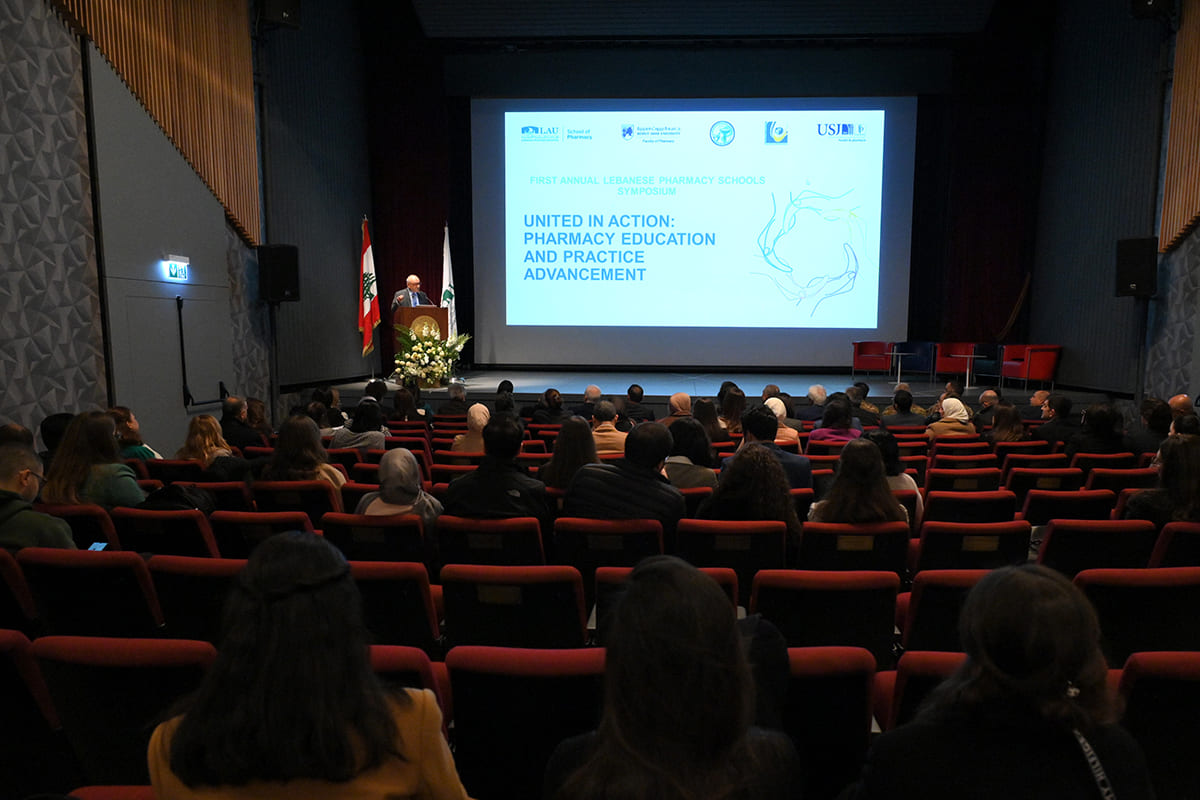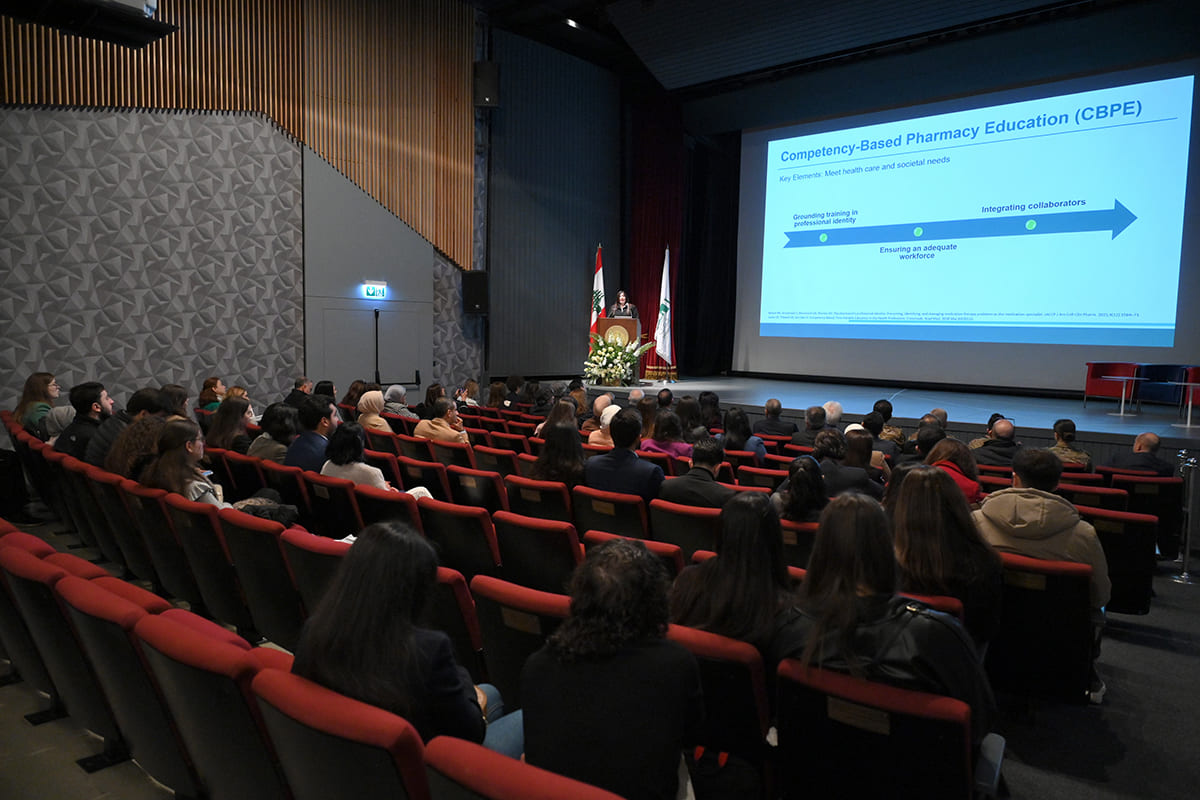Lebanon’s Pharmacy Educators and Stakeholders Unite in Action
The first annual symposium lays the groundwork for elevating pharmacy education and advocating for the profession on the national stage.
As the Lebanese healthcare and higher education sectors continue to reckon with a multifaceted crisis, LAU and its two medical centers are investing their efforts into mitigating some of the gravest threats to the country and the community.
To spearhead a nationwide overhaul of systems, particularly within pharmacy education, training and practice, the LAU School of Pharmacy initiated collaboration and facilitated meaningful discussions among the four pharmacy schools in Lebanon.
Titled United in Action, a two-day symposium was held on February 17-18 at Irwin Hall on the Beirut campus, bringing together administrators and faculty representatives from Saint Joseph University (USJ), Beirut Arab University (BAU), the Lebanese University (LU), the Lebanese International University (LIU), representatives from the Ministry of Public Health and Ministry of Education and Higher Education, the Lebanese Order of Pharmacists (OPL), the Lebanese Military Healthcare System, and local and multinational pharma, faculty, students, alumni and pharmacists from all over the country.
“Promoting the cause of quality higher education in pharmacy and every other academic endeavor requires concerted action,” said LAU President Michel E. Mawad in his welcoming address at the symposium. “This is a national duty, an ethical imperative and a professional must,” he added, asserting the call for collaboration among all those present.
While the school at LAU is a full member of the American Association of Colleges of Pharmacy (AACP) and its PharmD program is the only one outside the US that is accredited by the Accreditation Council for Pharmacy Education (ACPE), raising the bar for pharmacy education, training and practice at LAU and in Lebanon is a prominent goal on the school’s agenda.
In pursuit of this goal, LAU is pioneering the launch of a new world-class Pharmaceutical and Medical Research Center (PMRC) with an analytical and clinical unit as well as potential educational and research opportunities for the health science students on the LAU Byblos campus.
The first of its kind in Lebanon, the center addresses the need for testing generic drugs by running bioequivalence testing, which helps make locally produced drugs more accessible to the public.
“Whether it is informing the public and policymakers or advocating for all aspects of the profession, intra-and inter-professional collaboration among stakeholders is the key to advancing pharmacy education and practice In Lebanon,” explained Dean of the LAU School of Pharmacy Naser AlSharif.
Round-table discussions formed an integral part of the symposium, where stakeholders from different academic and professional backgrounds shared their recommendations to enhance pharmacy education, training and practice. From curriculum and regulation reform, experiential training and digital health to co-curricular activities in pharmacy education and the large-scope delivery of the military healthcare system, the topics were diverse and covered timely issues.
The long list of proceedings at the symposium included developing the pharmacy education framework with core competencies, establishing an association of colleges of pharmacy and collaborating with the Order of Pharmacists in Lebanon as well as with other healthcare entities to amplify advocacy efforts and enhance patient outcomes. The symposium’s organizing committee will be leading the efforts in publishing a white paper as a next step.
The committee includes Dean Alsharif, LAU Clinical Associate Professor Maya Zeineddine (PharmD ’11), Professor of Epidemiology at the LU Pascale Salameh, Associate Professor and PharmD Coordinator at BAU Souraya Domiati (BS ’98; PharmD ’99), Associate Professor of Toxicology at USJ Diane Antonios Gholam and Clinical Associate Professor and Assistant Dean at LIU Jihan Safwan (BS ’07; PharmD ’08). The committee acknowledged the support of Principle Executive Assistant to the Dean of the LAU School of Pharmacy Manal Helou Nader.
Dean of the LAU Gilbert and Rose-Marie Chagoury School of Medicine Sola Aoun Bahous, who led one of the round-table discussions, underscored the importance of regularly updating the curricula and running periodic assessments to close the gap between theory and practice. “We listened carefully to what the students had to say, and noted how the positioning of pharmacy as a partner in healthcare should be better communicated,” she said.
Along those lines, another round-table discussion highlighted the need to further engage students in practical work, as summarized by Assistant Professor and Nursing Program Director at the Alice Ramez Chagoury School of Nursing Bahia Abdallah. “Even within didactic work, the students should be in critical thinking mode, open-book assessment and flip classroom,” she noted, adding, “innovation should be applied to teaching.”
In that regard, the students, said Dr. Alsharif are “the most important stakeholders as they will go on to form the next generation of practitioners, so they absolutely had to have a seat at the table.”
From the students’ perspective, the symposium offered exposure to a myriad of learning and networking opportunities. Senior student Marc Anlian learned about more diversified opportunities for pharmacy rotations, including those at the multinational companies that were represented at one of the round tables.
His colleague, Adriana Sadek, discovered fields in pharmacy practice that are not prominently discussed in class, such as nuclear and veterinary pharmacy. “We also crossed paths with alumni who offered shadowing opportunities in pharmacovigilance and regulatory bodies,” she added.
Among the attendees were patients’ advocates, researchers and pharmacy practitioners who enriched the conversations with real-world evidence from Lebanon and abroad.
“The symposium constituted a milestone for the pharmacy community,” said alumnus Habib Abla (BS ’98; MBA ’02), managing partner at Healthpoint and president of the School of Pharmacy Alumni Chapter. “This is a strategic initiative that aims at shaping the profession’s present and future, and together, we are not just embracing change—we are leading it.”

